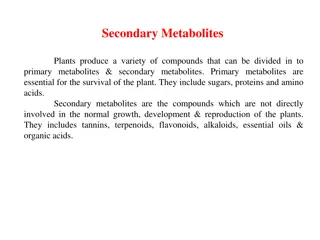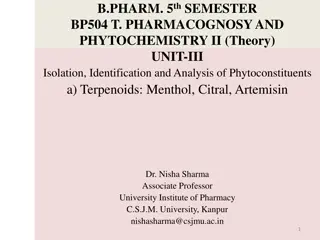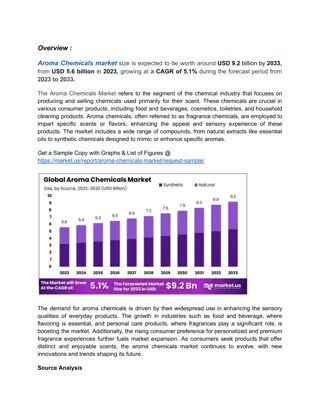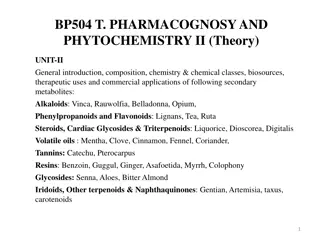
Understanding Obesity and Its Implications
Obesity is a complex medical condition characterized by excessive fat accumulation in the body, leading to various health issues and reduced life expectancy. This article discusses the challenges of obesity management, pharmacological approaches, natural remedies, and the impact of obesity on diseases like cardiovascular disease and diabetes.
Download Presentation

Please find below an Image/Link to download the presentation.
The content on the website is provided AS IS for your information and personal use only. It may not be sold, licensed, or shared on other websites without obtaining consent from the author. If you encounter any issues during the download, it is possible that the publisher has removed the file from their server.
You are allowed to download the files provided on this website for personal or commercial use, subject to the condition that they are used lawfully. All files are the property of their respective owners.
The content on the website is provided AS IS for your information and personal use only. It may not be sold, licensed, or shared on other websites without obtaining consent from the author.
E N D
Presentation Transcript
Medically obesity is a condition characterized by the excessive accumulation and storage of fat in the body leading to reduced life expectancy and/or increased health problems. Obesity affects not just appearance of a person but disease processes as well.
Obesity Pharmacological approaches to control obesity have become a prime priority. Due to unclear etiology, the cure of obesity is difficult and challenging. Current trends for obesity management involve multiple pharmacological strategies including blocking nutrient absorption, modulating fat metabolism, regulating adipose signals and modulating the satiety centers.
Obesity Although a few medications are available to control obesity yet most of them have been withdrawn due to their hazardous side effects. To seek safer remedies now many natural products are being recommended for curing obesity in most Asian countries. Currently approved medicines for treatment of obesity can be divided into two major classes; (i) Orlistat, which reduces fat absorption through inhibition of pancreatic lipase and (ii) Subutramine which is an anorectic or appetite suppressant
Plant products such as saponins, flavonoids, phenols and alkaloids possess anti-obesity properties. Presence of multiple-phytochemical combinations in plant drugs may result in synergistic effect by their action on multiple molecular targets, thus offering advantages over treatments which often use a single constituent.
Obesity is a chronic condition and a major risk factor for cardiovascular disease (CVD) and type 2 diabetes. Overweight or obese people have a greater probability than normal-weight people for developing metabolic syndrome, a condition characterized by high blood pressure, insulin resistance and dyslipidemias (high levels of total cholesterol, triglycerides and LDL and low levels of HDL)
Obesity during pregnancy may cause congenital malformations, such as neural tube effects, hypertension and gestational diabetes. In addition to these conditions, obesity also increases the risk of polycystic ovary disease, ischemic stroke, sleep apnea, gallbladder disease, gastro esophageal reflux, osteoarthritis, colon cancer, postmenopausal breast cancer and psychological disorders, such as depression.
Terpenoids in Obesity Any intervention aimed at treating obesity should also focus on how to restore balance of energy intake and energy expenditure. In a simplified form, these interventions could be divided into three classes: i) change in lifestyle; ii) pharmacological interventions and iii) surgical treatment. The first treatment option to lose weight is an energy reduced diet and regular physical movement.
Terpenoids in Obesity Increased physical movement can be used to balance energy expenditure by increasing the quantity of energy a body uses. Walking, cycling, swimming and aerobics are variety of exercises which are really effective and easy to implement. Unfortunately, for obesity treatment there is no magic pill . Orlistat is the hydrogenated derivative of lipstatin, which inhibits gastrointestinal lipase. This medicine acts in the lumen of the gut where it blocks the movement of gastrointestinal lipase
Terpenoids in Obesity Orlistat is also associated with high incidence of side effect(s) which includes steatorrhea, flatulence and fecal incontinence. Sibutramine is a serotonin and noradrenaline inhibitor but it may cause an increase in blood pressure. It acts mainly as an appetite suppressant. Bariatric or Weight Loss Surgery (WLS) was formerly classified as restrictive, malabsorptive or a combination of both. Sleeve gastrectomy, Roux-en-Y gastric bypass and laparoscopic adjustable gastric banding are generally used surgical procedures . Some disadvantages of these procedures are long-term complications such as anemia and malnutrition in the subjects






